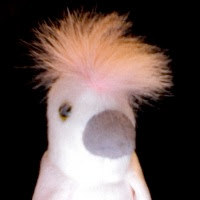After yesterday's pledge to write songs quickly and easily for this month's songwriting project, I nonetheless struggled for at least an hour with the melody and chords for today's song.
I had some music in my head, but it didn't sound right when I played through it. First I slowed down the tempo and added some ornamental chords at the beginning of each phrase. Then I tried different, simpler ornamental chords. It all fit together well enough, but I knew it still wasn't quite right. Finally the verse clicked into place when I shifted the start of the vocal line from the first beat to the second beat, and I changed the chord structure from four 2-bar phrases to two 4-bar phrases.
I'm happy with the results, but I already fell short of my goal of practicing simple, easy songwriting.
How do difficulties find their way into the creative process? First of all, I should be clear that there is a certain amount of honest work in writing lyrics and music. My favorite example of this is the fugue, a musical form in which three or four layered melodies interact with each other and simultaneously happen to create a musically meaningful implied chord line. Writing a fugue is like solving a multi-dimensional number puzzle.
Similarly, in the lyrics I wrote today, I had to find rhyming words and still tell an effective story. English offers a limited number of words and ways of saying things, so it can take some real work to make the pieces fit together while keeping the story as short as possible.
There is also unavoidably an element of emotional risk in any creative work. If you don't put anything at risk, you won't create much of value.
But besides these detailed, mechanical writing tasks, and the risk that an artist must take, there are also more than enough creative difficulties that are unproductive, unnecessary, and (somewhat) avoidable. When you struggle with your material as I did today, it's a sign that you aren't going with the flow of your creative process.
What interrupts the flow of creativity? The top culprit is trying to control the outcome. It's a paradox of being an artist: in theory, you have total control of every detail of your creation, but in practice, if you try to exert that control, the whole thing can grind to a halt or fall to pieces. You need to use a very light touch as you play with your creative materials. The song has to take its own shape, and at best you can guide it, ever so delicately, in the right direction.
But then you worry about how the song is shaping up. I need this song to be good. I want to impress my bandmates. I need a hit, already! I need to prove that I can still do this. These worries are all perfectly understandable, but you can't afford to bring them into the creative process. It's like carrying ten-pound weights in your hands — but these are the same hands that you're using to delicately guide the creation of the song. These extra weights, your worries, make your work clumsy and heavy-handed. You can pound your lifeless song into submission, but it won't be a song you enjoy performing.
You might not be able to stop worrying entirely, but you must find a way to set your worries aside, just temporarily, so you can write. Some writers ritually put their worries into a jar before beginning to write, and promise to take them back out again as soon as they're done with their writing session.
Another closely related way to interrupt your creative flow is to try to do something that is beyond your abilities. Again, this is understandable. Artists perpetually underestimate the value of the things they do easily — their strengths — and overestimate the importance of the things that they don't know how to do — their weaknesses.
It's good to systematically exercise your creative techniques, to build your strengths and turn weak areas into strengths. But do that in the form of technical exercises. Don't bring it into your regular songwriting. When you have a specific goal and a deadline, it's not time to stretch your technique. It's time to use the strengths that you already have.
So if you've signed up for February Album Writing Month — or if you have a real album to record and you need to write some songs in a hurry — go with your strengths. Go with what you already know. Write about things that you already care about. Write in musical styles that you are already comfortable with. Write in your own natural voice. Set all your worries aside and trust your creative process to do its best work. (It always will!) Then, let it flow. Let it be easy to write one song after another. You already have all the power, the talent, the ideas, and the resources that you need. Go to it!
Subscribe to:
Post Comments (Atom)


No comments:
Post a Comment